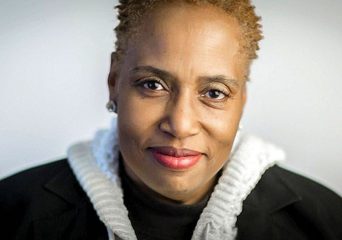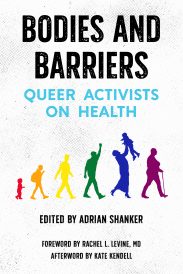

by Imani Woody
Special to Lesbian.com
Excerpted from Bodies and Barriers: Queer Activists on Health (PM Press, 2020) edited by Adrian Shanker
I’m pretty sure when U.S. actress Bette Davis said, “Getting old ain’t for sissies,” she was not referring to gay older adults specifically but to the challenges that aging can bring to us all, no matter our identity. Old is not the destination to be traveling in our youth-obsessed culture.
I remember when my then seventy-eight-year-old stepmother asked me who I was calling old, when I referred to her and some of her peers as old! Getting there myself, old age can be particularly challenging for LGBT same-gender loving (SGL) baby boomers and older adults born during the Silent Generation.
We all have heard that fifty is the new forty . . . and Disrupt Aging. As if living to be fifty years old and getting older are not only biological markers of the human species but gifts. Ageism is hardwired into our institutional systems and can systematically attack from inside and outside. Ageism is insidious and can be mean-spirited. It can cripple one’s self-esteem and limit access to housing, social services, and societal integration. If you have lived to be in your fifth decade, you have probably experienced ageism. If you are an older woman, you probably began to experience it in your forties. If you are an older gay male, ageism may have knocked on your door in your thirties. Ageism systematically regulates people toward “the back of the bus.” Ageism is so prevalent that many older LGBT/SGL folks are going back into the closet, because being gay and being old is just too hard.
The experiences of an LGBT elder born in the Silent Generation of McCarthyism can be quite different from the experiences of a LGBT baby boomer reared in the times of the Stonewall riots and the Civil Rights Movements.
Here is the voice of a sixty-year-old Black transgender woman: “I’m the biggest advocate for my own care, but frequently it can be frustrating, extremely frustrating. . . . I had an incident with one of the case managers at a large medical facility and when I tried to report it, it seemed like no one wanted to hear it. I completely lost medical coverage and benefits and it was really frustrating to get it back. For about four months I had nothing and tried to explain that my health was in jeopardy. I need medicine for my heart, and I have diabetes. I just want to be as healthy as I can be and sometimes, I get tired, mentally, emotionally, and physically. If I were younger, I don’t think I would be dismissed so easily. You can see the look on their face when they just think you’re being cranky and old.”
Studies comparing key health indicators based on sexual orientation found that LGBT midlife and older adults experience disparities in regard to disability, cardiovascular disease, obesity, stress, and physical health. Emotional distress and social isolation are two of the largest threats to health for LGBT/SGL elders and are exacerbated by perceptions of having been treated badly or discriminated against. There has been empirical evidence of medical professionals not wanting to provide services to LGBT/SGL people.
Many mainstream health and provider service organizations, wellness centers, and retirement communities routinely state that they do not have any LGBT/SGL people on their census or as clients. When an agency states they don’t have LGBT/SGL older adults, they set up a culture of invisibility that can also grow into a culture of oppression for clients and staff alike. Not seeing oneself reflected in the business of the organization can leave LGBT/SGL older adults vulnerable when they are the population most in need of these services to ensure a quality life in old age.
A lifetime of discrimination has reduced the support networks and economic security of many of our LGBT/SGL elders, leaving them vulnerable to housing instability at a critical point in their lives, and many are priced out of housing. The federal guideline states that when 30 percent of your income is for housing, it is a “housing burden.” In many states, a one-bedroom apartment costs more than 100 percent of a social security check.
Research and experience show that when LGBT/SGL people apply for housing in independent senior living communities or attempt to rent and buy apartments and homes, they routinely encounter discrimination, and their housing choices become even starker.
Housing is a social determinant of health, and housing is a human right.
Dr. Imani Woody is the founding director and CEO of Mary’s House for Older Adults, Inc. She has a PhD in Human Services, specializing in nonprofit management. Her thesis is titled Lift Every Voice: A Qualitative Exploration of Ageism and Heterosexism as Experienced by Older African American Lesbian Women and Gay Males When Addressing Social Services Needs.






